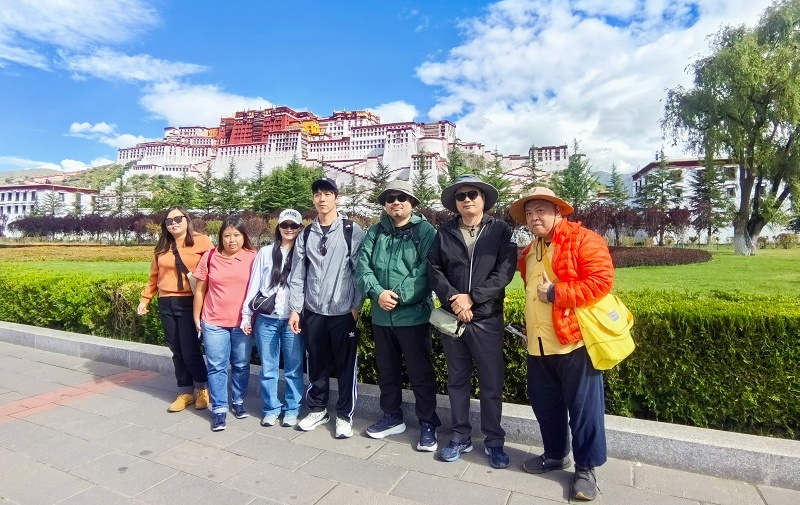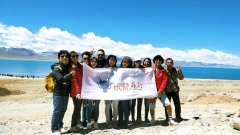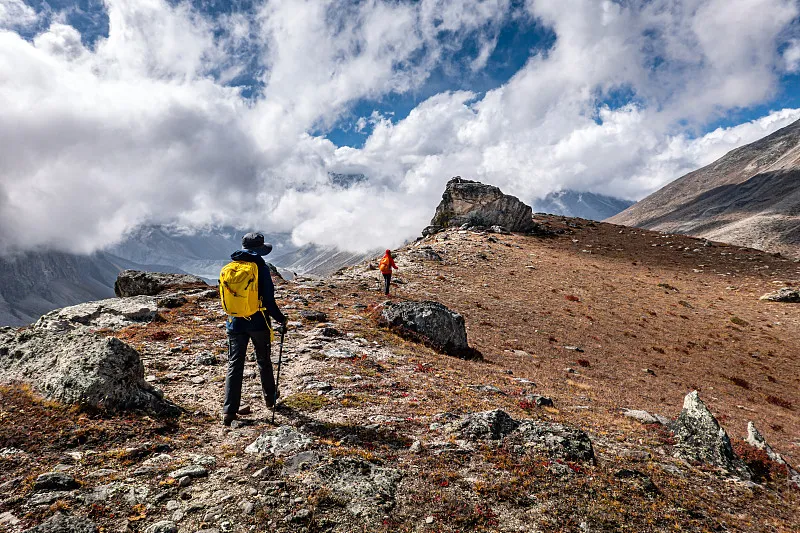Tibetan culture speaks softly but profoundly through small gestures, meaningful words, and everyday warmth. Among these, one phrase rises above the rest as both greeting and blessing: “Tashi Delek.” For travelers new to the plateau, those two words are a golden key — a simple, kindly phrase that opens doors to conversation and smiles.
Origins and Meaning of Tashi Delek
“Tashi Delek” is a compact blessing. In spirit it wishes good fortune, auspiciousness and well-being — the cultural equivalent of “may good things come to you.” It binds goodwill, polite recognition and spiritual blessing into a short, resonant phrase you can say in a heartbeat.
Unlike many casual greetings, Tashi Delek carries an element of blessing. It is appropriate for meeting and parting, celebrating an occasion, and expressing sincere goodwill. The phrase is used in daily life, during festivals, and when visitors first encounter local Tibetans. Saying it places you, briefly, inside an expression of community-minded warmth.
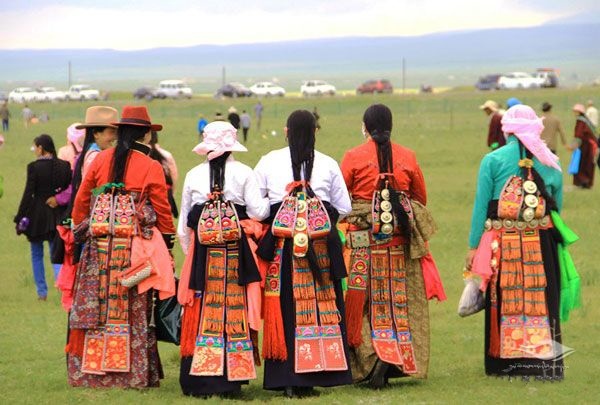
How to Say It – Tashi Delek
Phonetically, most visitors use a friendly and serviceable pronunciation: “TAH-shee DEH-lek.” Say the first syllable clearly, soften the second, and finish with a light, upbeat tone. Practice once or twice and it will feel natural.
Different Tibetan dialects and neighboring Himalayan languages have slightly different ways of expressing the same sentiment. In some areas, you may hear longer or more formal replies; in frontline tourist spots, people may respond in English or another regional greeting. The essence remains the same: a reciprocal wish of goodwill.
How to Respond to “Tashi Delek”
The most appropriate response is to repeat the phrase back: “Tashi Delek.” Often a smile, a small bow or a slight nod accompanies the reply. This reciprocal exchange is polite, straightforward and always well received.
If you want to go a step further, press your palms together near your chest (similar to a Namaste) and lower your head slightly. In formal or heartfelt moments, Tibetans may exchange a khata (ceremonial scarf) as an additional sign of respect.
During Losar, Tashi Delek becomes especially meaningful. People call out the greeting as they visit homes, exchange khatas, and offer best wishes for the new year. If you are in Tibet during Losar, you will encounter more elaborate customs: dances, prayers, ritual offerings and communal feasts. Saying Tashi Delek during this time places you inside the festive flow.
Pilgrimages, temple anniversaries, and family milestones also use Tashi Delek. Use it when entering a family home for a celebratory visit or when you meet villagers during festivals — it shows cultural sensitivity and opens conversations.
Other Tibet Social Cues
The tongue tradition
In some Tibetan areas, older people stick out their tongues as a friendly cultural gesture. Historically it reassured others that they were not the reincarnation of a cruel king; today it’s performed playfully and with warmth. If a local elder shows you their tongue as a greeting, smile back — it’s a compliment wrapped in tradition.
Bowing and the Namaste gesture
A slight bow, especially when addressing elders or lamas (monastic teachers), is respectful. Placing palms together near the heart — similar to Namaste — is an accepted sign of courtesy and humility.
Related Himalayan greetings
Nearby regions have their own greetings: for instance, Jullay in parts of Ladakh and surrounding regions can serve as hello, goodbye, thank you and please. If you travel widely across the Himalayan belt, you’ll find many local variations of warmth — using the regional greeting will always be appreciated.
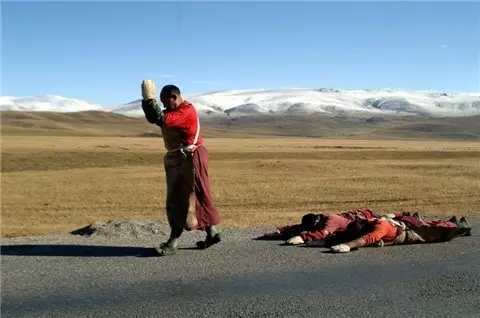
How Travelers Use Tashi Delek
Meeting hosts and guides
When introduced to a homestay host, local guide or monastery host, say “Tashi Delek” with a smile. If you’re offered tea, accept courteously; if a khata is presented, receive with both hands and a small bow.
Starting conversations with strangers
Saying “Tashi Delek” to a shopkeeper, street performer or fellow traveler is an excellent icebreaker. It’s less formal than a handshake and usually sparks immediate friendliness.
Departures and thank-yous
Tashi Delek works for leaving as well as arriving. At the end of a visit, repeat the phrase and offer thanks: it’s a polite way to close the encounter and wish continued good fortune.
Do’s and Don’ts for Using Tashi Delek
Do
- Do pronounce the phrase clearly and say it with warmth.
- Do pair the phrase with a smile or slight bow.
- Do use it at Losar and festive occasions.
- Do accept a khata respectfully with both hands.
- Do follow local rituals at monasteries (walk clockwise, be quiet).
Don’t
- Don’t use Tashi Delek jokingly or sarcastically — it’s a sincere blessing.
- Don’t force a khata on strangers; offer it in proper social contexts.
- Don’t interrupt prayers or rituals to pose for photos.
- Don’t step over sacred thresholds or walk in front of people spinning prayer wheels.
- Don’t assume every Tibetan will practice the same customs; adapt with sensitivity.
Photography, Gifts and How to Be a Responsible Visitor
Photo etiquette
Always ask before photographing people, children or sacred rituals. If in doubt, a polite “Tashi Delek” and a question will usually lead to a friendly yes — or a gentle decline.
Gift giving
Small, modest gifts (tea, quality packaged sweets, school supplies) are often appreciated in remote communities. If giving gifts during ritual moments, ask your guide how to proceed.
Leave no trace
Respect the landscape and the neighborhood. Don’t litter, disturb sacred spaces, or behave in ways that disrespect cultural protocols.
Why Using Tashi Delek Transforms Your Tibet Trip
Saying Tashi Delek is more than a short phrase for travelers; it’s a cultural key. It signals respect, openness and curiosity. It invites conversation rather than observation, connection rather than mere sightseeing. For international visitors, practicing this small phrase often leads to deeper hospitality, invitations to share tea, and chances to enter the rhythm of Tibetan life. When you say Tashi Delek with sincerity — not as a souvenir phrase but as a real wish for someone’s well-being — you will notice doors open. Locals often respond with warmth, tell stories, and sometimes invite visitors to join in ceremonies or family gatherings.
For travelers who want a carefully curated cultural itinerary, China Dragon Travel offers guided Tibet and Himalayan journeys that emphasize respectful cultural exchanges. Our local guides help you learn greetings like Tashi Delek in context, arrange safe and meaningful visits to monasteries, and create opportunities for authentic hospitality so you can return home with lasting memories — and new friends.
Tashi Delek — may it accompany your travels, open smiles where you go, and make every shared moment a little more auspicious.



